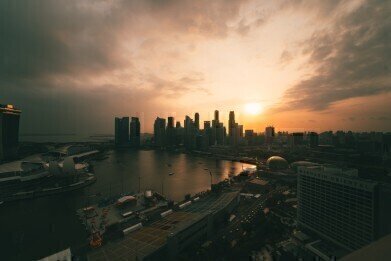Air Clean Up
What is Singapore’s Anti-Haze Law?
Oct 20 2015
Over the past several weeks, months and even years, the city-state of Singapore has been grappling with rising levels of haze and air pollution, caused primarily by forest fires in neighbouring Indonesia. It is suspected that these fires are being started intentionally by individuals or companies with an interest in clearing the land.
As such, the Singapore government last year instituted the Transboundary Haze Pollution Act, which gives them power to prosecute and punish those found responsible for starting the fires. Fines of up to $100,000 are currently in place for those found guilty of causing or condoning a forest fire which results in unhealthy levels of smog and haze in Singapore.
A Mounting Problem
These fires, which are generally started by companies in Indonesia in an effort to prepare the land for palm oil plantations, are an illegal way to circumvent environmental law and cheaply clear away forestation. However, the pollution they cause in both nearby Singapore and Malaysia far exceeds acceptable levels and has brought about grave concerns over the health risks posed to citizens of the countries.
Indeed, in 2013, hazardous air pollution levels in Singapore reached the highest levels on record for three days running. In June of that year, the Pollution Standards Index (PSI – Singapore’s principal measure for determining air quality) reached 321 one day, followed by 371 and finally peaking at the highest it has ever been at 401.
Clearly the Singaporean people and their government are unhappy about this wanton destruction of their environment, but under current international law, they are not permitted to douse the fires themselves without Indonesian consent. Help has been offered to Indonesia several times but always rejected.
Understandably, Singaporean authorities have called for the guilty parties to be named so that appropriate action could be taken against them. In 2013, eight major Southeast Asian companies were named as being involved, while earlier this year, a Singapore-listed company also became implicated.
“It would be the height of irony if the haze was caused, directly and indirectly, by companies with a strong Singaporean connection, whether in terms of ownership or investments by Singapore entities,” commented Eugene Tan, Associate Professor at Singapore Management University (SMU).
Criticism of the Anti-Haze Law
While many prominent Singaporean commentators agree that the Act is a step in the right direction, they also feel it stops short of wielding any real power. Among other criticisms, many believe the law should involve harsher fines, increased policing, improved cooperation between the relevant authorities and high rewards for informants. One economist Ivan Png at the National University of Singapore even suggested a reward of up to 12 times the annual salary of those with information.
The biggest problem facing the enforcement of the law is determining who the guilty parties are, since this relies heavily on the ability and willingness of Indonesian officials in Jakarta. As such, many, like Professor Tan, believe the law will do little to help.
“It’s small comfort to most Singaporeans,” explained Professor Tan. “Plagued by the scourge of the haze and for which the law strikes them as being a paper tiger.”
Events
Nov 26 2024 Paris, France
Nov 27 2024 Istanbul, Turkey
H2O Accadueo International Water Exhibition
Nov 27 2024 Bari, Italy
Biogas Convention & Trade Fair 2024
Nov 27 2024 Hanover, Germany
Dec 11 2024 Shanghai, China









-as-feedstock.jpg)




